A pragmatic approach to building a European Army
An argument in favour of merging the territorial defence forces of an inner core of EU member states

ECFR Alumni · Head, ECFR Berlin
Senior Policy Fellow
European integration; EU reform; European foreign and security policy; EU enlargement and Neighbourhood Policy; Europe in the world; global governance; German foreign and security policy; transatlantic relations; Europe/Asia
English, German
Josef Janning was a senior policy fellow and head of the Berlin office of the European Council on Foreign Relations until November 2019. His topics of focus include European integration, EU reform, European and German foreign and security policy, global governance and transatlantic relations.
Janning joined the European Council on Foreign Relations in April 2014 as senior policy fellow in the Berlin office. From 2013 to 2014 he was a Mercator Fellow at the German Council on Foreign Relations. Prior to that he served as Director of Studies at the European Policy Centre (EPC) in Brussels. Between 2001 and 2010, Janning led the international policy work as Senior Director of the Bertelsmann Foundation, a major private German foundation. Earlier positions in his career include Deputy Director of the Center for Applied Policy Research (CAP) at Munich University from 1995-2007. Previously, he has held teaching positions at the University of Mainz, the Hebrew University of Jerusalem, and a guest professorship at Renmin University of Beijing. He has worked with leading think tanks in Europe, the US and Asia, and engaged in and led various international study groups, high-level groups and commissions.
Janning has published widely on European affairs, International Relations, EU foreign and security policy, German foreign and Europe policy as well as global affairs. On these issues he is also a frequent commentator with German and international media.
An argument in favour of merging the territorial defence forces of an inner core of EU member states
Steinmeier’s review process has come up with a range of prescriptions for the German foreign ministry, and the far-reaching reform envisioned could transform German diplomacy
The extension of the eurozone’s assistance programme for Greece dominates the European debate in Germany and links eurozone politics to the future of Europe.
Russia no longer sees its future as being with Europe – but its departure may not have the results it expects
As Europe pushes for negotiation over Ukraine, the Munich Security Conference showed the depth of division not only between Russia and the West, but between the Western partners as well
ECFR Senior Policy Fellow, Josef Janning, co-author of the policy brief A Fresh Start for TTIP talks about the challenges of finding a free…
Germany became the leader of Europe’s foreign policy because of circumstance, not through its own design.
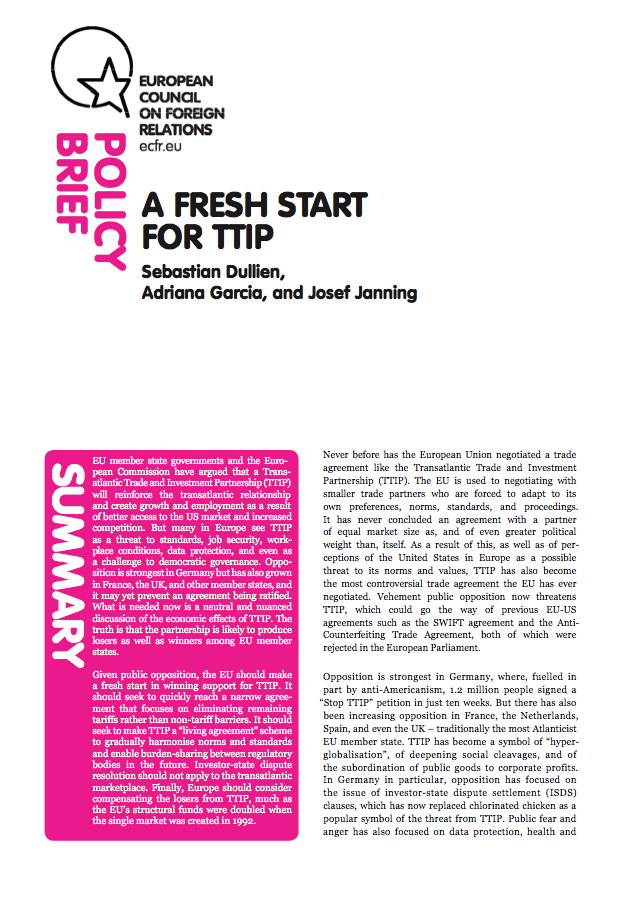
Given public opposition, the EU should make a fresh start in winning support for TTIP
British-German relations, while shaped by a mutual sense of respect, are almost at a loss on a common agenda
Two all-too-plausible scenarios could turn 2015 into an annus horribilis for the Union
Fragmentation in the EU makes it increasingly difficult for member states to build coalitions. The EU Coalition Explorer reveals potential new groupings
The results of the European election confront EU leaders with a considerable challenge: navigating a new, more fragmented, and polarised political environment
Introduction For most Europeans, it is now obvious that the foreign policy of US President Donald Trump threatens the global liberal order. Trump’s hostility towards…
Despite financial and refugee crises, research suggests the European Union is getting stronger, not weaker
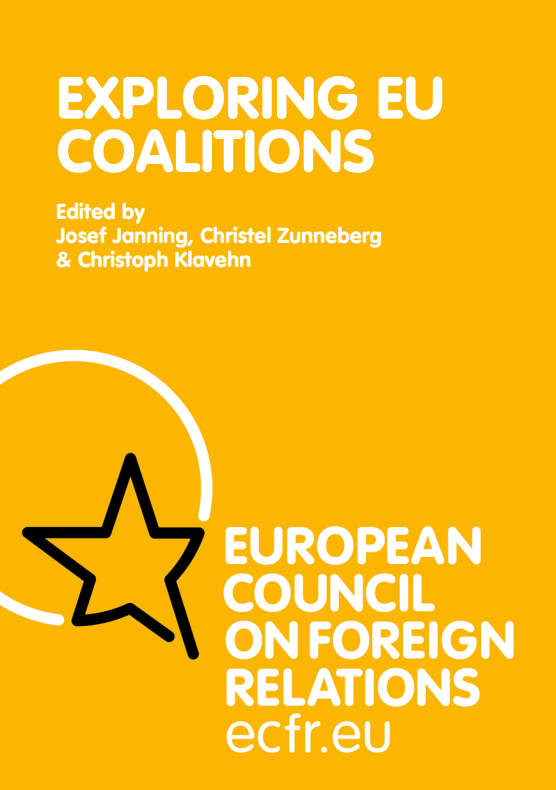
New essay collection points way to potential coalitions for flexible European cooperation
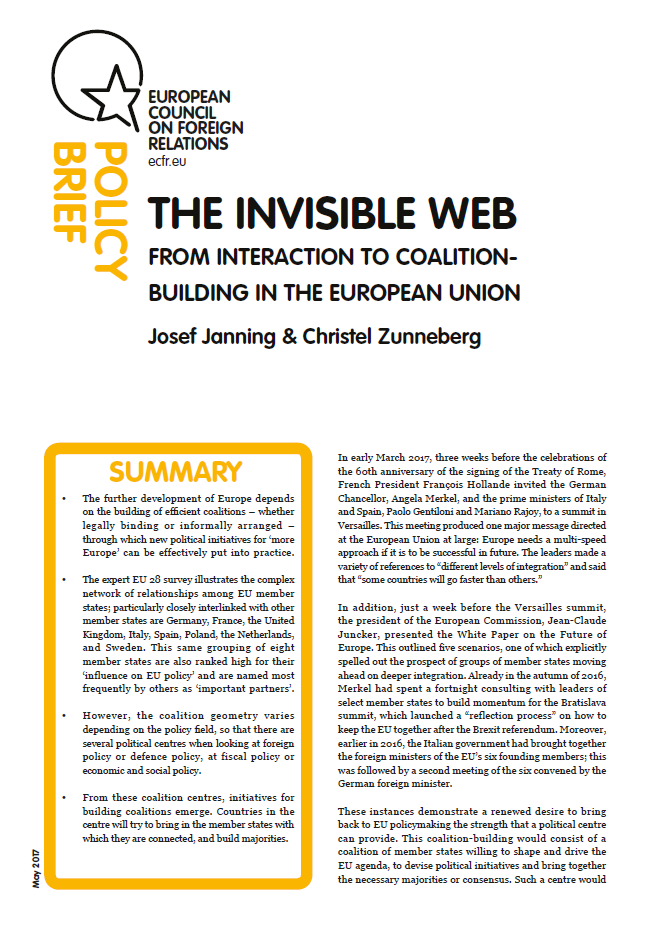
Survey of experts in 28 capitals illuminates the complex network of relationships among EU member states
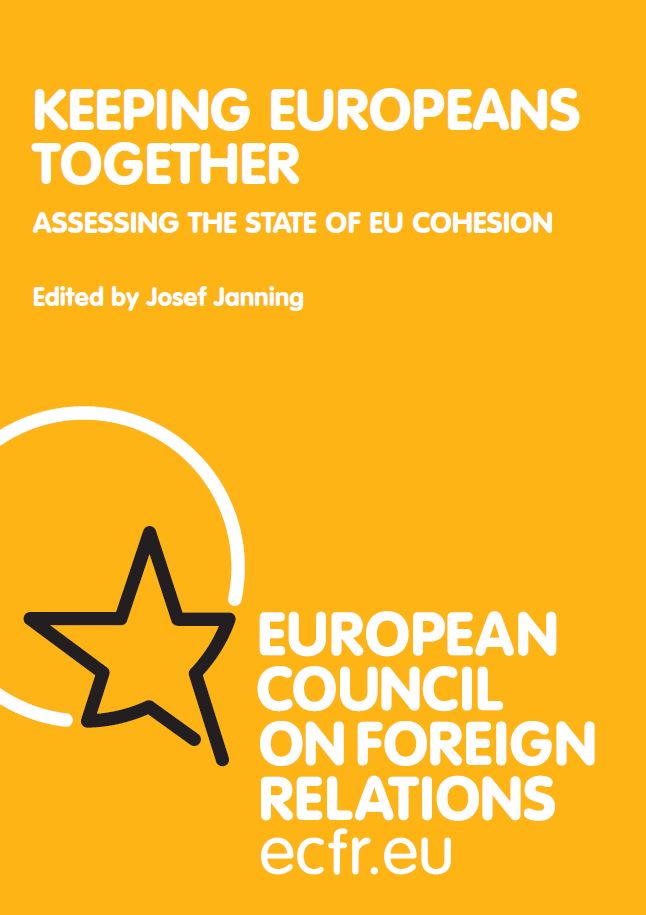
This volume reflects the diversity of European cohesion. It provides the national context and personal assessments from 28 EU member states
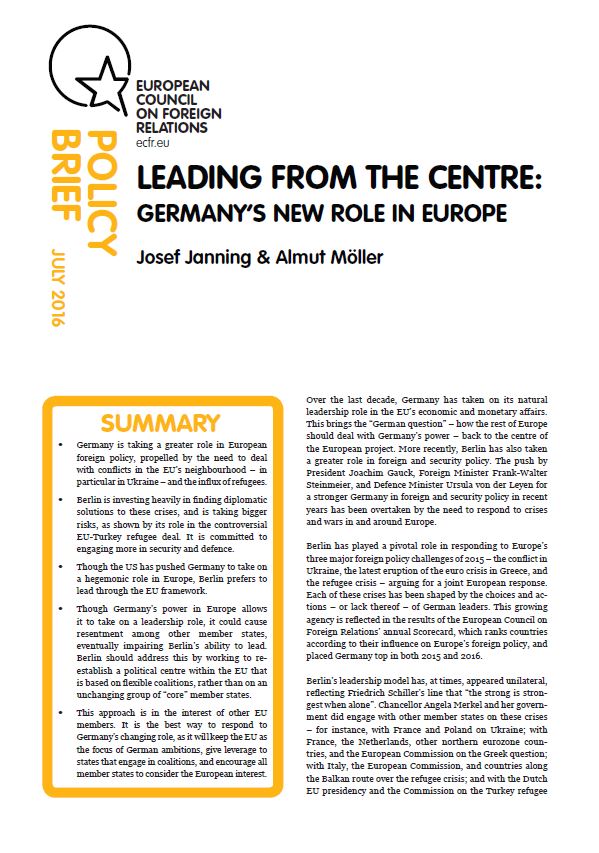
Berlin does not want to dominate Europe, but to exercise leadership via EU institutions – something that will be essential in a post-Brexit world
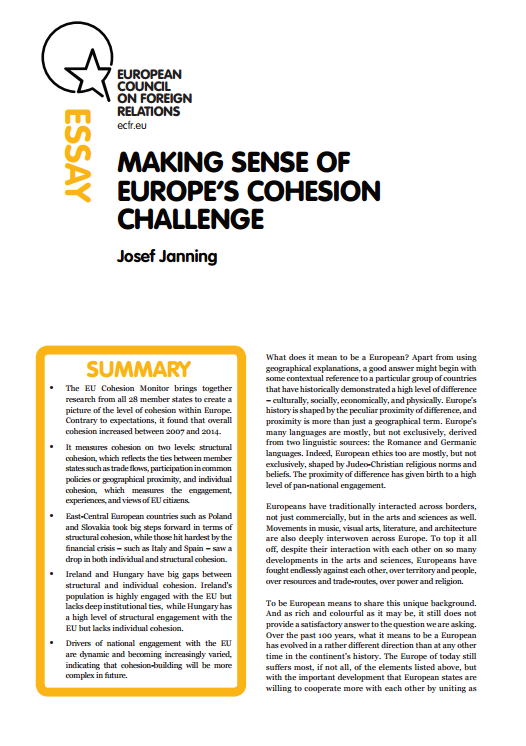
A new study from ECFR shows that, perhaps surprisingly, between 2007 and 2014, cohesion among EU member states has improved, even after years of crises
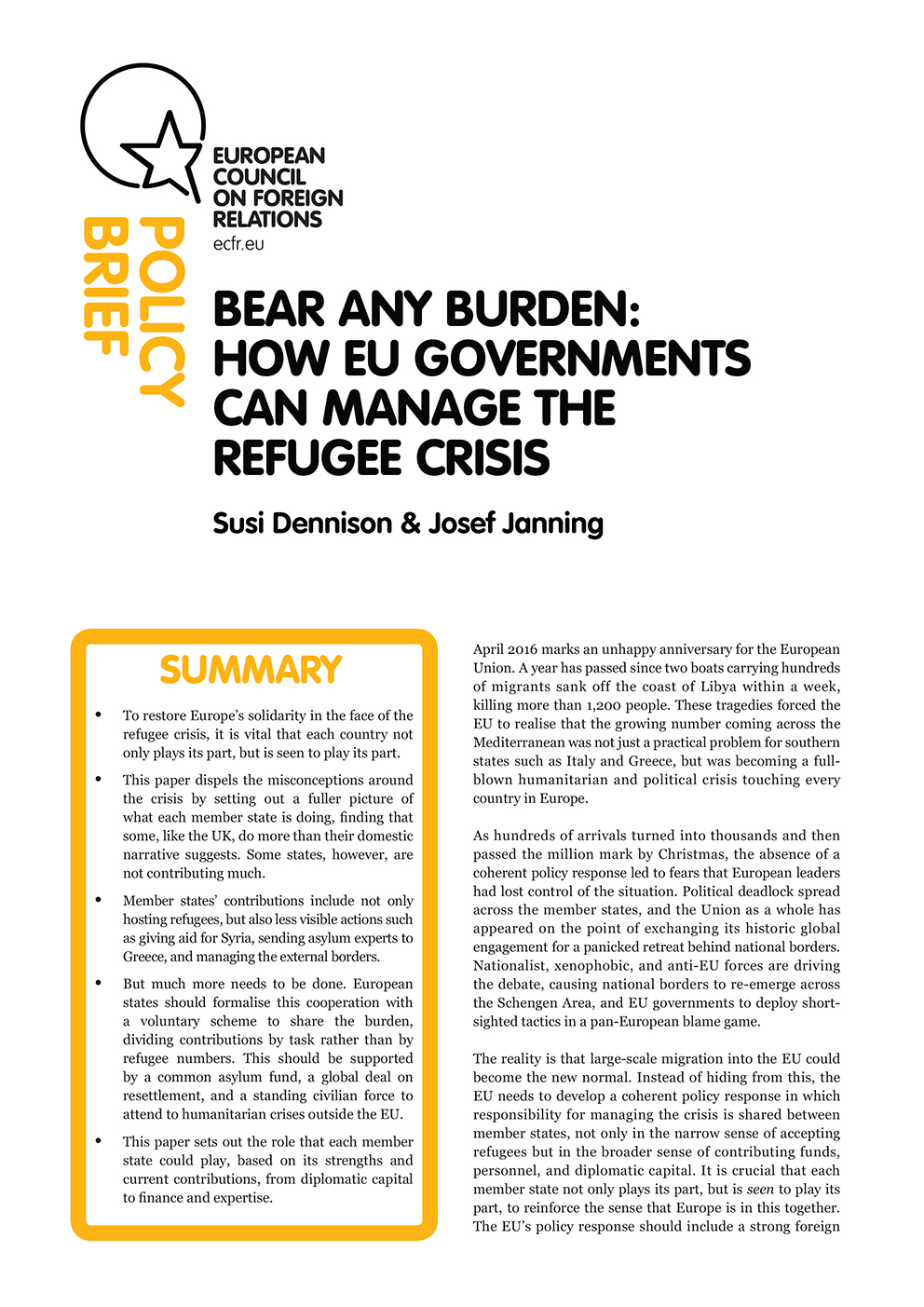
The EU should broaden the scope of what is expected of member states on burden sharing on refugee crisis
If Europe isn’t what it used to be, this is largely because Germany isn’t what it long wanted to be
Berlin has turned punching below one’s weight into an art form. This is not good enough, either for Germany or for Europe
Britain helped bring modern, unified, and peaceful Germany into being. Its Brexit convulsions have trashed this historic reputation – probably for good.
One week after climate talks at UNGA and the unveiling of the government’s new climate plan, Germany’s gap between lofty goals and actual initiatives is still striking
The heads of ECFR’s offices in Paris and Berlin share the thinking in their countries about the latest round in the Brexit saga
The heads of ECFR’s offices in Paris and Berlin share the thinking in their countries about the latest round in the Brexit saga
For most voters, the battle over people and positions would be revealing if only it wasn’t so confusing. It is misleading to frame the nomination process as an example of backroom politics prevailing over parliamentary democracy
With the US opting out of its traditional European role, the “German question” has returned. And European leaders will need to make sacrifices if they are to address it
“Zusammenhalt” is a buzzword in the European election manifestos of the German parties. But what does it exactly mean in the political discourse?
The Hague will need new allies in a post-Brexit EU. ECFR’s EU Coalition Explorer reveals where it should start looking
European cohesion is bouncing back after crisis years. The EU Cohesion Monitor presents new insights on cohesion as an underestimated source of strength and collective action in the EU
What does Angela Merkel’s decision to stand down as leader of the Christian Democratic Union (CDU) mean for Germany and Europe? Mark Leonard discusses with…
Eine Podiumsdiskussion mit Anne-Marie Descôtes, Botschafterin der Französischen Republik in Deutschland Michael Roth, Staatsminister für Europa, Auswärtiges Amt Moderation: Lykke Friis, Korrespondentin…
ECFR’s EU28 Survey reveals the interactions, perceptions, and chemistry between the 28 EU member states. This week, Mark Leonard joins Josef Janning, Christoph Klavehn and…
Mark Leonard speaks with Josef Janning, Silvia Francescon, Piotr Buras and Manuel Lafont Rapnouil about the major rift between German Chancellor Angela Merkel and her interior…
ECFR’s director Mark Leonard discusses the consequences of the German political crisis for Germany and for Europe with ECFR's Berlin office director, Josef Janning, and…
ECFR’s director Mark Leonard talks with the heads of ECFR's Paris and Berlin offices, Manuel Lafont Rapnouil and Josef Janning about Macron's speech and his…
ECFR’s director Mark Leonard talks with the head of ECFR’s Berlin Office Josef Janning and ECFR's policy fellow Ulrike Franke about the upcoming federal elections…
This week, rather than putting out our ordinary podcast, we're leaving the floor to Manuel Lafont Rapnouil, head of ECFR Paris, who's hosting a discussion…
Nouveau podcast de notre série sur l'élection présidentielle de 2017 ayant pour objectif de traiter les thèmes d'actualité et de contribuer au débat…
ECFR’s director Mark Leonard speaks with Christine Ockrent, journalist, Jana Puglierin, head of the Alfred von Oppenheim Center for European Policy Studies, and Josef Janning,…